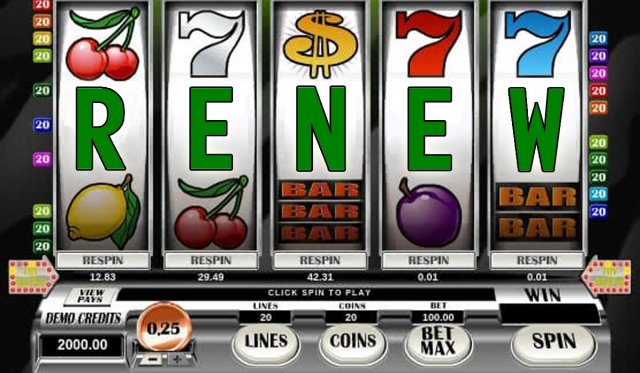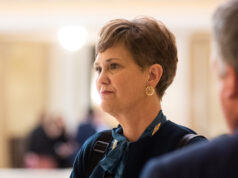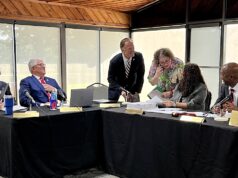

A federal judge has ruled that Oklahoma’s Model Tribal Gaming Compact automatically renewed Jan. 1, a significant blow to Gov. Kevin Stitt’s controversial efforts to renegotiate gaming compacts with the more than 30 federally recognized tribes that operate casinos in Oklahoma.
“The court finds that the plaintiffs’ and intervenors’ compacts with the State of Oklahoma automatically renewed for an additional 15-year term on Jan. 1, 2020, by operation of the unambiguous terms of Part 15(B),” wrote Timothy DiGiusti, a judge in U.S. District Court for the Western District of Oklahoma.
Stitt had been sued over Part 15 (B) of the 2005 gaming compacts by the Chickasaw Nation, Choctaw Nation, Cherokee Nation, the Citizen Potawatomi Nation, the Muscogee (Creek) Nation, the Quapaw Nation, the Delaware Nation, the Seminole Nation, the Wichita and Affiliated Tribes. The tribes had argued that while that provision in the compacts said the compacts expired, it also said they automatically renewed because the state had taken certain action to license racetracks.
While it’s possible the Stitt administration will appeal his decision, DeGiusti ultimately agreed with the tribes that the gaming compacts automatically renewed. From his decision:
It is undisputed that organization licensees (horse racetracks) have been authorized, and are currently authorized, to conduct electronic gaming as well as betting on live horse racing. The disputed issue is whether this authorization was “pursuant to any governmental action of the state” taken after the effective dates of the compacts.
There is no question the [State Tribal Gaming Act] delegated to [the Oklahoma Horse Racing Commission], an executive agency, the power to implement its provisions and to authorize organizational licenses (horse racetracks) to conduct electronic gaming if they meet statutory and regulatory requirements. There is also no question that OHRC took these governmental actions following the effective dates of the compacts. Indeed, OHRC issued such licenses to two horse racetracks in October 2019 for the year 2020. No more was required for the compacts to automatically renew on Jan. 1, 2020, for a successive 15-year-term.
DiGiusti’s 10-page decision (embedded below) included a footnote clarifying the statement above.
“The state’s argument that the language has unintended consequences (resulting in perpetual renewal) is not persuasive,” the judge wrote. “The inference in the state’s argument — that the conditions for automatic renewal cannot be avoided — is inaccurate.”
DiGiusti had previously ordered the Stitt administration and the tribal plaintiffs into arbitration — which could have happened earlier during the compact dispute had the compacts’ arbitration clause not been severed in a 2018 court decision. The court-ordered arbitration did not reach a resolution to the disagreement with the lawsuit’s remaining plaintiffs.
“This is a good, good day,” said Stephen Greetham, general counsel for the Chickasaw Nation. “The court has affirmed the plain terms of our compact and has restored stability and certainty to a critical pillar of Oklahoma’s economy. This is something we all should celebrate.”
Oklahoma Indian Gaming Association Chairman Matthew Morgan issued a statement praising the judge’s decision.
“We appreciate that the court moved quickly to confirm what tribal leaders have always known — the plain language of our intergovernmental agreements mean what they mean, and here, those words mean our gaming compacts automatically renewed Jan. 1, 2020,” Morgan said. “We look forward to our tribal governments’ continued work under these gaming compacts and our continued contributions to the economic stability and health of our tribal nations and Oklahoma.”
Stitt released a lengthy statement around 1 p.m.:
I am deeply disappointed by the federal court’s ruling. It confirms my fears, and the fears of many fellow Oklahomans, that the State entered into a poorly negotiated deal and now we must bear the cost of this mistake. The federal court determined that the 2004 gaming compact autorenewed for 15 years because of an action taken by an agency’s unelected board to reissue licenses for gaming at horse racing tracks. This decision, coupled with the recent U.S. Supreme Court ruling on McGirt, means Oklahomans have important questions to face regarding our future. Among other things, we will need to explore the challenges of who will pay taxes and who won’t, of how we will guarantee a competitive marketplace, and of how the State will fund core public services into the next generation. In short, we face a question of constitutional proportions about what it means to be the state of Oklahoma and how we regulate and oversee all business in our state.
When I came into office, I inherited letters from tribes saying the compacts were set to expire on January 1, 2020. In my first six months, I traveled across the state listening to tribal leaders and to leaders from many sectors of Oklahoma’s economy about these compacts. What I heard and what I learned is that only a few tribes were receiving most of the benefit from gaming; the one-size-fits-all approach to the Model Gaming Compact was clearly broken. As your governor, I was driven by a conviction that we could look to the future and generate new, sustainable opportunities for the next generation of Oklahomans.
As the state began its efforts to renegotiate, the 2004 Gaming Compact continued to prove its shortcomings were much deeper. Judge DeGuisti’s decision to send the state and the tribes to court-ordered mediation was right and it was fruitful. It brought differing tribal voices to the table that historically were cut out from these conversations. It resulted in new gaming compacts, affirmed by the U.S. Department of Interior, and it showed Oklahoma what could be possible with a fresh slate.
The new gaming compacts demonstrate the state could offer unique, thoughtful opportunities for each tribe. In turn, the state could achieve fair-market rates, as high as 13 percent, for Class III gaming operations, and we could establish clear auditing and transparency measures to protect the integrity of the compact and ensure the trust of all Oklahoma citizens. Our new gaming compacts show when the state and tribes are at the table together, we can achieve better public policy and healthier relationships. We could create gaming compacts that level the playing field for all Oklahoma job creators and spur hundreds of millions of dollars more in revenue for our public schools.
As we move forward, I will continue to hold fast to my commitment as your governor to work with all Oklahomans on Top 10 solutions that deliver a stronger, more prosperous future for our state.
Background on compact fight
Stitt has argued since the summer of 2019 that the gaming compacts did not automatically renew and that he wanted to negotiate new compacts that could be a “win-win” for the state of Oklahoma and tribes engaged in Class III casino gambling.
But tribes disagreed, and Stitt’s indelicate public statements on the matter — referring to the compacts as “contracts” and noting only Oklahoma’s “sovereignty” during his 2020 State of the State address — insulted many tribal leaders and members. He stumbled while pronouncing the name of the United Keetoowah Band of Cherokee Indians in a November press conference, and he watched as his secretary of Native American affairs resigned amid the turmoil.
Still, Stitt eventually found some footing by offering new compact proposals to a series of smaller tribes. The Comanche Nation and the Otoe Missouria Tribe each signed a new compact in April, but the Oklahoma Supreme Court ruled that Stitt did not have the authority to include language about event wagering and certain table games that were not legal under the State Tribal Gaming Act. Those two compacts contain severability clauses, however, and the tribes have stated their intention to continue operating under their new compacts, which include potential authorization of lucrative new casinos close to metro areas. The Comanche and Otoe Missouria compacts also include most-favored nation clauses, meaning they could claim a right to pursuing the new casinos while operating under the lower exclusivity fee scale of the original compacts that have been deemed to automatically renew.
Stitt has also signed two new compacts with the United Keetoowah Band of Cherokee Indians and the Kialegee Tribal Town, which do not currently have casinos and have faced opposition to their casino efforts from the Cherokee Nation and the Muscogee (Creek) Nation, respectively.
Read the full order from Judge DeGiusti
 Loading...
Loading...
(Update: This story was updated at 2:20 p.m. Tuesday, July 28, to include Stitt’s statement.)




















